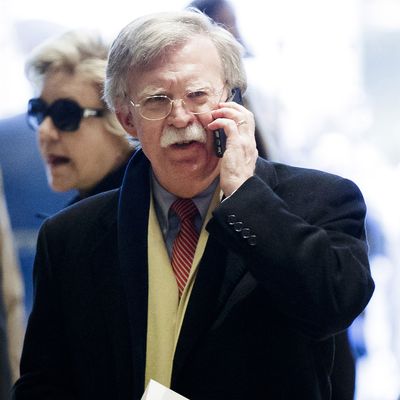
A year ago today, Donald Trump stood on a debate stage in Las Vegas and spat out one of the most scathing indictments of the Iraq War ever uttered by an American politician — let alone by a Republican presidential candidate.
“We have done a tremendous disservice not only to the Middle East — we’ve done a tremendous disservice to humanity. The people that have been killed, the people that have been wiped away — and for what?” Trump fumed. “It’s not like we had victory. It’s a mess. The Middle East is totally destabilized, a total and complete mess. I wish we had the 4 trillion dollars or 5 trillion dollars. I wish it were spent right here in the United States on schools, hospitals, roads, airports, and everything else that are all falling apart!”
Few Democrats have ever had the chutzpah to convey this message to the American public — to say, in so many words, “nearly 5,000 of your children lost their lives to the cause of squandering precious resources and making the world a worse place to live.”
But voters didn’t shoot the messenger; they shot down instead the idea of another Bush administration.
And Trump continued to burnish his (entirely undeserved) reputation for tough truth-telling, by bleating his indictment of the Iraq invasion through the entirety of his campaign. After using his critique of the war to discredit the Republican Establishment in the primary, he used it to neutralize Hillary Clinton’s strength on foreign policy in the general election.
Just last week, he used it to undermine the authority of American intelligence agencies, who were telling him things about Russian hacking that he did not wish to hear.
It’s far from clear that intelligence analysts who wrote up the agency’s findings on Russian interference in the 2016 election were “the same people” who prepared the most inaccurate assessments of Saddam Hussein’s arsenal.
But it is clear that John Bolton — the undersecretary of State for arms control and international security affairs under George W. Bush — cherrypicked those inaccurate assessments in building the case for invasion. And, according to multiple reports, Donald Trump plans to name Bolton as his pick for deputy secretary of State.
Which is to say: Trump would like to make one of the least repentant Iraq War hawks — one who can’t wait to bring “shock and awe” to Iran — as one of the United States’ most powerful diplomats.
To appreciate just how much Bolton was one of those “same people” the president-elect alluded to, observe this testimony by former State Department official Greg Thielmann, published Wednesday on the foreign policy blog LobeLog.
I was a firsthand witness to the negative consequences of Bolton’s style and substantive approach while serving as director of the office in the State Department’s intelligence bureau (INR/SPM) responsible for monitoring Iraqi WMD issues. As my office delivered to him the heavy volume of sensitive information provided by the intelligence community, he demonstrated a penchant for quickly dismissing inconvenient facts and rejecting any analysis that did not serve his policy preferences …
… As the path to war was paved throughout the fall, Bolton knew very well how the administration was misrepresenting to the public the more nuanced details of the 2002 National Intelligence Estimate (NIE) on Iraqi WMD. The Senate Select Committee on Intelligence exhaustively documented these distortions in a series of bipartisan reports following the 2003 invasion.
In one of the countless dizzying developments of the Trump transition, the GOP’s most acidic Iraq War critic isn’t perturbed by these facts — but the Republican Establishment is.
The New York Times reports that the Republican chairman of the Senate’s foreign relations committee Bob Corker, former secretary of State Condoleezza Rice, former secretary of Defense Robert Gates, and former national security adviser Stephen Hadley are all opposed to Bolton’s nomination.
Kentucky senator Rand Paul has made his opposition public.
“There is something to be said for one of the top diplomats in the country being diplomatic,” Paul observed Wednesday.
Trump’s pick for secretary of State, Exxon CEO Rex Tillerson, is also, reportedly, unenthused by the prospect of having Bolton as his deputy.
And other unnamed Republicans have indicated to the Times that they’d prefer to see the party “leave the Bush years in the past.”
Considering all this, why, exactly, is Bolton a leading candidate for the job? There appear to be two answers:
1. Sheldon Adelson
2. John Bolton knows how to kiss up.
Adelson makes John Bolton look like Medea Benjamin — while the potential diplomat would like to drop some missiles on Tehran, the casino magnate has publicly called for nuking the country (ya know, to prevent a crazy state from obtaining atomic weapons and then launching it against some other nation that it isn’t even at war with).
But Adelson likes the cut of Bolton’s jib enough to back him. And Adelson’s affinity for giving millions of dollars to Republican candidates gives that recommendation the weight of gold.
Ultimately, though, it may be the very talent that Bolton displayed during the Bush administration — the ability to bend information into a narrative that pleases his bosses — that has won him Trump’s affection.
This week, Bolton argued that the CIA’s reports about Russian hacking may have been a “false-flag operation” — an Obama administration conspiracy to undermine the legitimacy of the president-elect (presumably, the fact that the conspirators didn’t publicize Russia’s intention to aid Trump during the campaign itself merely testifies to Obama’s blundering incompetence).
Bolton tells Trump what he wants to hear. And at the end of the day, the president-elect may care more about having his ego affirmed than he does about “the people that have been wiped away” by John Bolton’s aversion to diplomacy.






























